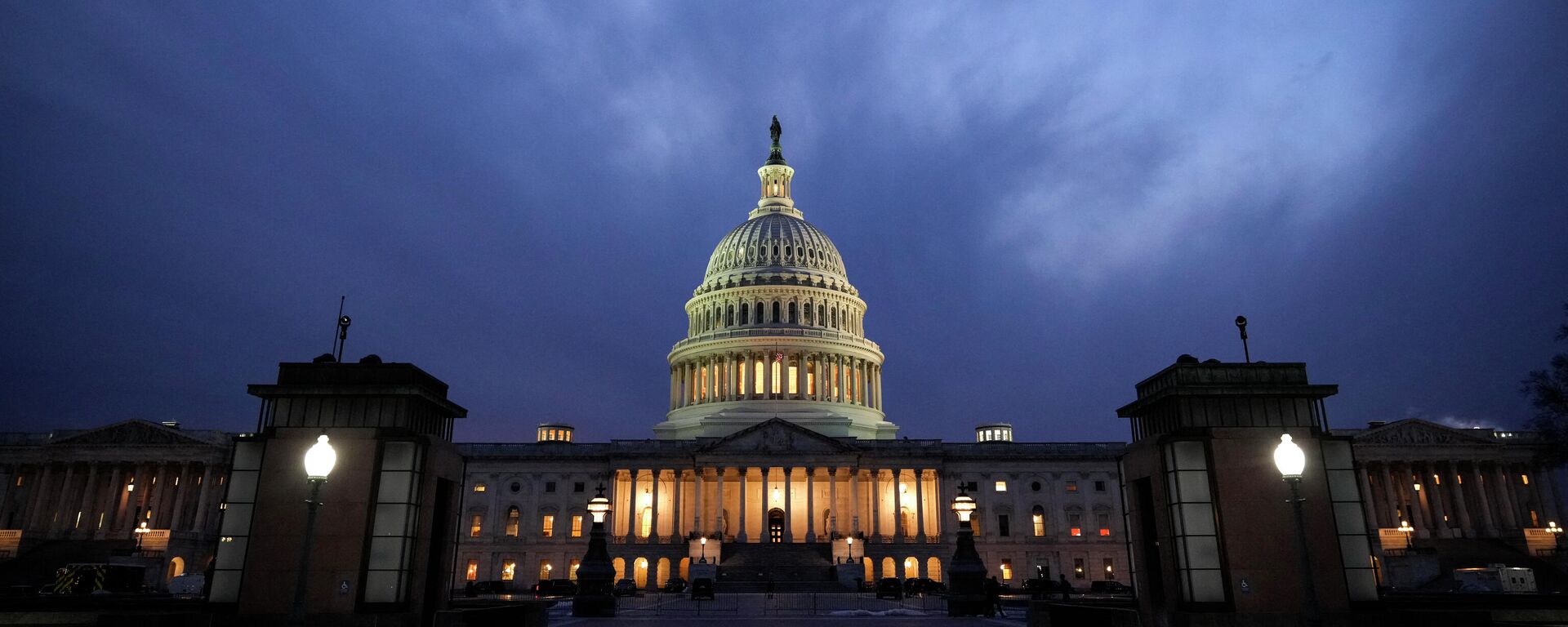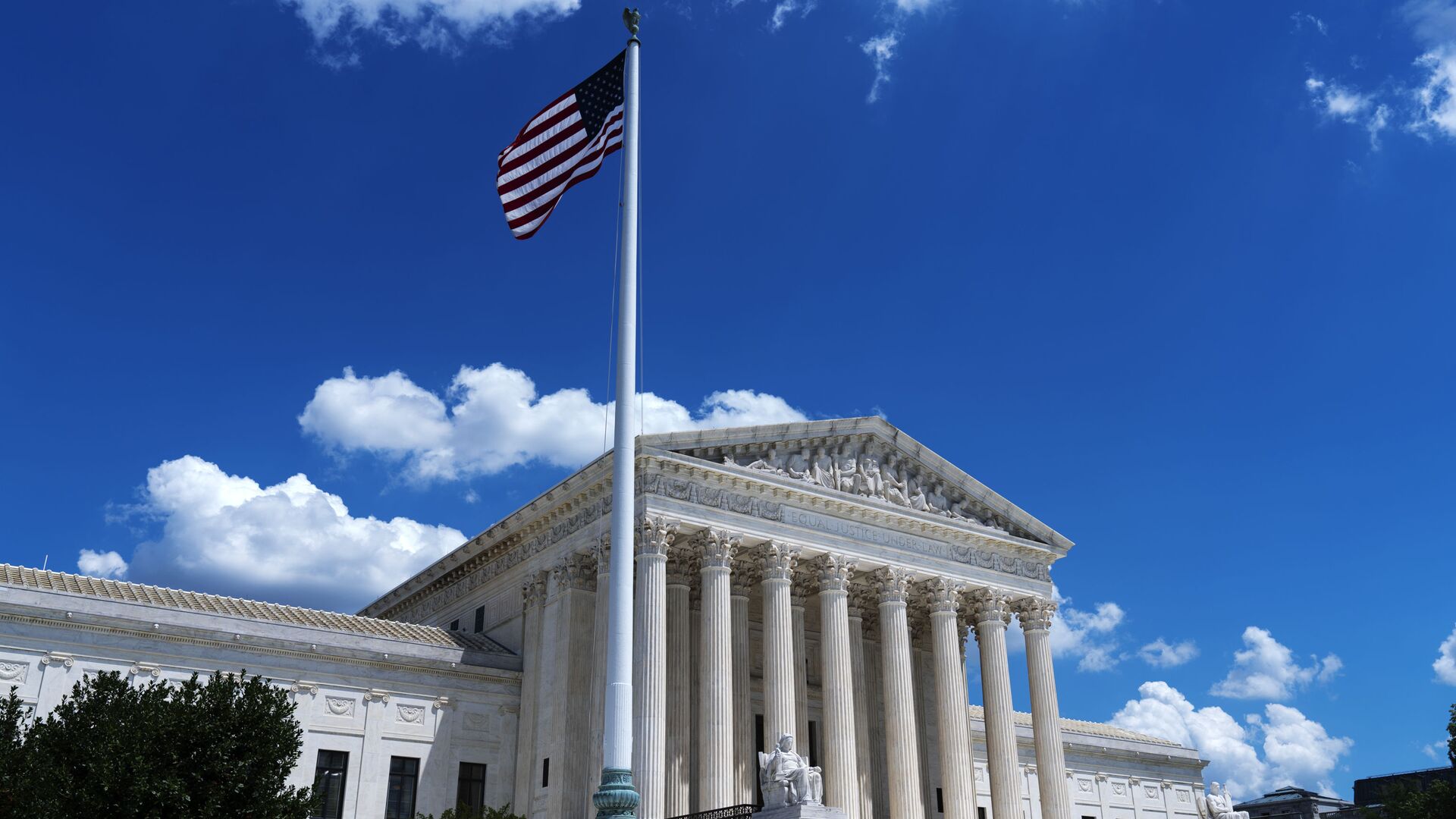https://sputnikglobe.com/20220308/supreme-court-denies-gop-bid-to-overturn-nc-pennsylvania-rulings-tossing-their-new-electoral-maps-1093675146.html
Supreme Court Denies GOP Bid to Overturn NC, Pennsylvania Rulings, Tossing Their New Electoral Maps
Supreme Court Denies GOP Bid to Overturn NC, Pennsylvania Rulings, Tossing Their New Electoral Maps
Sputnik International
In February, Republicans in two states, North Carolina and Pennsylvania, asked the Supreme Court to intervene in redistricting disputes and overturn the... 08.03.2022, Sputnik International
2022-03-08T05:52+0000
2022-03-08T05:52+0000
2022-03-08T05:52+0000
us
supreme court
brett kavanaugh
republicans
https://cdn1.img.sputnikglobe.com/img/07e5/07/01/1083285915_0:160:3073:1888_1920x0_80_0_0_872bd27a8e4fc0a8e18bf2681975de75.jpg
US Supreme Court justices on Monday handed a temporary win to the Democrats as they denied a request from Republicans to block state court rulings tossing out GOP-drawn voting maps in North Carolina and Pennsylvania. Every 10 years, in a process that unfolds over several months in capitals, each US state redraws new congressional and legislative voting districts following the US Census, with the outcomes credited with potentially moulding the balance of power in Congress for the consecutive decade. However, last month, state courts in both North Carolina and Pennsylvania called upon independent experts to draw new congressional district maps, after they determined that their state legislatures had failed to meet “state constitutional and statutory requirements”. Republican-aligned groups in North Carolina then asked the US Supreme Court to overturn the state court decisions regarding GOP-drawn voting districts, which had been made ostensibly to counter “unlawful partisan gerrymanders”. In North Carolina, the GOP-crafted map was estimated to have likely given Republicans an “unfair” advantage in 10 of the state’s 14 congressional districts. In Pennsylvania, a group of Republican voters had brought the challenge after the state’s Supreme Court voted to substitute the map drawn by the GOP-controlled legislature with one crafted by a political scientist from Stanford that was purportedly “fairer”. ‘Fair‘ Congressional Maps Despite the challenge, on Monday, two separate rulings left intact state court decisions whereby judicially imposed maps, drawn by outside experts, were substituted for those drawn by state legislatures.In the North Carolina case, it was ruled 6-3 to block the GOP-conceived maps from going into effect, with conservative justices Samuel Alito, Neil Gorsuch, and Clarence Thomas having dissented from the court's decision. Samuel Alito noted that he believed the GOP challengers in the North Carolina case would “likely … prevail on the merits if review were granted,” underscoring that the issue should be resolved “sooner or later.” Justice Brett Kavanaugh expressed the view that the issue needed to be considered at a later date, as the 2022 midterm elections were too close. "It is too late for the federal courts to order that the district lines be changed for the 2022 primary and general elections," he said, adding: There were no noted dissents from justices regarding the Pennsylvania case, with it now being referred to a three-judge court. “The parties may exercise their right to appeal from an order of that court granting or denying interlocutory injunctive relief,” the justices wrote. Both disputes had raised the question of which branch of state government has final say over how federal elections are governed. Republican challengers to the state court rulings had argued that the Constitution’s “Elections Clause” gives state legislatures precedence over state courts and executive branch officials in determining the manner in which federal elections are carried out in their state. The US Constitution's Election Clause actually states that the "Times, Places and Manner of holding Elections for Senators and Representatives, shall be prescribed in each State by the Legislature thereof." According to Republican state legislatures, the clause implies that only state legislatures may make election rules, unless the federal government passes contrary legislation. The Republicans have argued that by drawing new districts, the state supreme courts overstepped their authority.
https://sputnikglobe.com/20220220/retirements-for-congressional-democrats-hit-30-year-high-ahead-of-us-midterm-election-1093215526.html
Sputnik International
feedback@sputniknews.com
+74956456601
MIA „Rosiya Segodnya“
2022
News
en_EN
Sputnik International
feedback@sputniknews.com
+74956456601
MIA „Rosiya Segodnya“
Sputnik International
feedback@sputniknews.com
+74956456601
MIA „Rosiya Segodnya“
us, supreme court, brett kavanaugh, republicans
us, supreme court, brett kavanaugh, republicans
Supreme Court Denies GOP Bid to Overturn NC, Pennsylvania Rulings, Tossing Their New Electoral Maps
In February, Republicans in two states, North Carolina and Pennsylvania, asked the Supreme Court to intervene in redistricting disputes and overturn the respective state court rulings that had replaced the GOP-drawn maps with those drawn by outside experts.
US Supreme Court justices on Monday handed a temporary win to the Democrats as they denied a request from Republicans to block state court rulings tossing out GOP-drawn voting maps in North Carolina and Pennsylvania.
Every 10 years, in a process that unfolds over several months in capitals, each US state redraws new congressional and legislative
voting districts following the US Census, with the outcomes credited with potentially moulding the balance of power in Congress for the consecutive decade.
However, last month, state courts in both North Carolina and Pennsylvania called upon independent experts to draw new congressional district maps, after they determined that their state legislatures had failed to meet “state constitutional and statutory requirements”.
Republican-aligned groups in North Carolina then asked the US Supreme Court to overturn the state court decisions regarding GOP-drawn voting districts, which had been made ostensibly to counter “unlawful partisan gerrymanders”.
In North Carolina, the GOP-crafted map was
estimated to have likely given Republicans an “unfair” advantage in 10 of the state’s 14 congressional districts.
In Pennsylvania, a group of Republican voters had brought the challenge after the state’s Supreme Court voted to substitute the map drawn by the GOP-controlled legislature with one crafted by a political scientist from Stanford that was purportedly “fairer”.
‘Fair‘ Congressional Maps
Despite the challenge, on Monday, two separate rulings left intact state court decisions whereby judicially imposed maps, drawn by outside experts, were substituted for those drawn by state legislatures.
In the North Carolina case, it was ruled 6-3 to block the GOP-conceived maps from going into effect, with conservative justices Samuel Alito, Neil Gorsuch, and Clarence Thomas having dissented from the court's decision.
Samuel Alito noted that he believed the GOP challengers in the North Carolina case would “likely … prevail on the merits if review were granted,” underscoring that the issue should be resolved “sooner or later.”

20 February 2022, 23:47 GMT
Justice Brett Kavanaugh expressed the view that the issue needed to be considered at a later date, as the 2022
midterm elections were too close. "It is too late for the federal courts to order that the district lines be changed for the 2022 primary and general elections," he said, adding:
“The issue is almost certain to keep arising until the Court definitively resolves it. Therefore, if the Court receives petitions for certiorari raising the issue, I believe that the Court should grant certiorari in an appropriate case — either in this case from North Carolina or in a similar case from another State. If the Court does so, the Court can carefully consider and decide the issue next Term after full briefing and oral argument.”
There were no noted dissents from justices regarding the Pennsylvania case, with it now being
referred to a three-judge court. “The parties may exercise their right to appeal from an order of that court granting or denying interlocutory injunctive relief,” the justices wrote.
Both disputes had raised the question of which branch of state government has final say over how federal elections are governed.
Republican challengers to the state court rulings had argued that the Constitution’s “Elections Clause” gives state legislatures precedence over state courts and executive branch officials in determining the manner in which federal elections are carried out in their state.
The US Constitution's Election Clause actually states that the "Times, Places and Manner of holding Elections for Senators and Representatives, shall be prescribed in each State by the Legislature thereof."
According to Republican state legislatures, the clause implies that only state legislatures may make election rules, unless the federal government passes contrary legislation. The Republicans have argued that by drawing new districts, the state supreme courts overstepped their authority.




